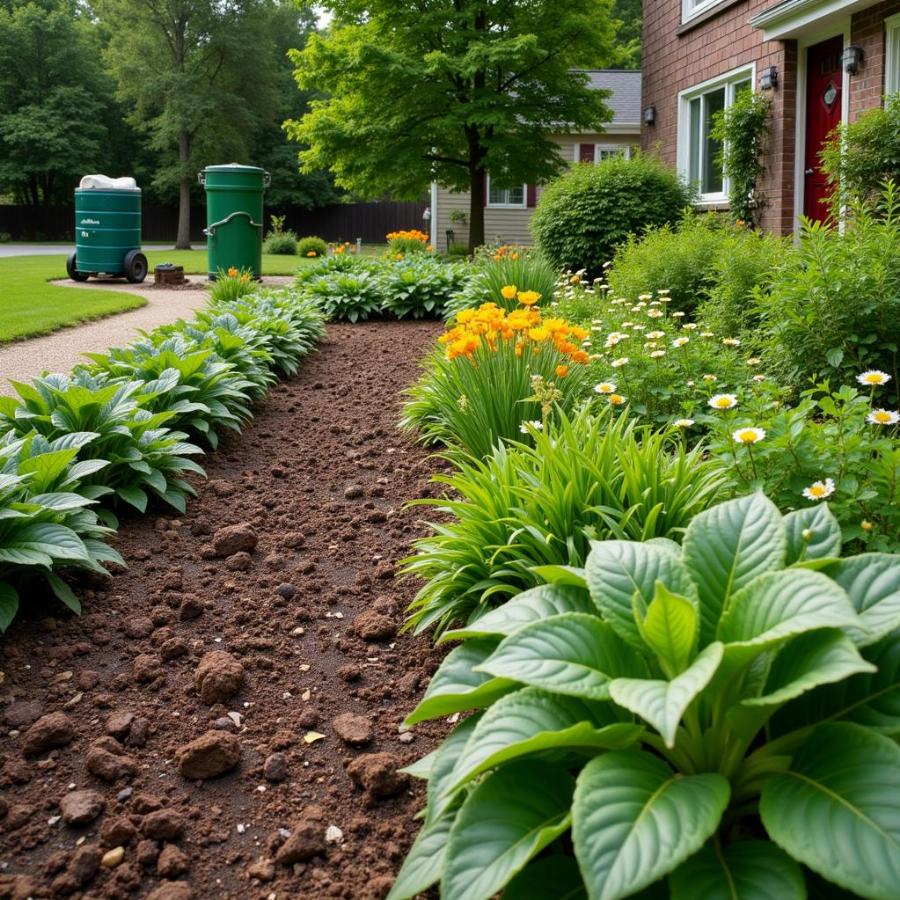Dog poop and fertilizer – two things you might not immediately associate with each other. But for gardeners and dog owners alike, the question of whether dog waste can be used as a fertilizer often comes up. The short answer is: not directly. Unlike herbivore manure, dog waste contains pathogens and parasites that can be harmful to plants and humans. However, with proper composting, dog poop can be transformed into a safe and beneficial soil amendment.
Understanding the Risks of Using Raw Dog Poop as Fertilizer
Using fresh dog poop as fertilizer poses several risks. Dog waste contains harmful bacteria like E. coli and Salmonella, as well as parasites like roundworms and hookworms. These can contaminate your garden, potentially affecting your vegetables and even posing health risks to you and your family. Directly applying dog waste to your garden can also burn plants due to its high nitrogen content.
Composting Dog Waste: Turning Waste into Wealth
The key to safely using dog poop as fertilizer lies in composting. Composting is a natural process that breaks down organic matter, including dog waste, into a nutrient-rich soil amendment. The high heat generated during composting effectively kills harmful pathogens and parasites, making the composted material safe for use in your garden. There are several ways to compost dog waste:
- Dedicated Dog Waste Compost Bins: These bins are specifically designed for composting pet waste. compost bin for dog waste offer an enclosed system that manages the composting process effectively.
- Adding Dog Waste to Your Existing Compost Pile: If you already have a compost pile, you can add dog waste to it, but ensure it reaches a high enough temperature (140-160°F) to kill pathogens.
- Burying Dog Waste: While not technically composting, burying dog waste in designated areas of your yard allows it to decompose naturally over time.
The Benefits of Composted Dog Poop
Composted dog waste, unlike the raw form, offers several benefits for your garden:
- Rich in Nutrients: Dog waste is a good source of nitrogen, phosphorus, and potassium, essential nutrients for plant growth.
- Improves Soil Structure: Composted dog waste helps improve soil aeration and water retention.
- Reduces Landfill Waste: Composting dog waste keeps it out of landfills, where it can contribute to environmental problems.
Is Composting Dog Waste Right for You?
Composting dog waste requires some effort and dedication. You need to monitor the composting process and ensure the proper conditions for decomposition. If you’re not comfortable with the process, there are alternative ways to dispose of dog waste, such as using biodegradable dog waste bags. dog artificial turf can also help minimize the mess in your yard.
 Dog Poop and Fertilizer
Dog Poop and Fertilizer
Does Picking Up Dog Poop Help Your Lawn?
Picking up dog poop is essential for maintaining a healthy lawn. Leaving dog waste on your lawn can create dead patches due to the high nitrogen content. green dogs unleashed promotes responsible dog ownership and encourages picking up after your pet.
What Happens If You Don’t Pick Up Dog Poop?
Not picking up dog poop can lead to several problems:
- Environmental Contamination: Rain can wash dog waste into waterways, polluting water sources.
- Health Risks: Dog waste can harbor parasites and bacteria that can infect humans and other animals.
- Unsightly and Unsanitary: Dog waste is simply unpleasant to have around. astroturf for dogs can be a good alternative for maintaining a clean yard.
Conclusion
While fresh dog poop isn’t suitable as fertilizer, composting can transform it into a valuable soil amendment. By composting dog waste responsibly, you can benefit your garden, reduce landfill waste, and contribute to a healthier environment. Remember, responsible dog ownership includes proper waste management.
FAQ
- Can I use dog poop as fertilizer for vegetable gardens? No, you shouldn’t use fresh dog poop on vegetable gardens due to the risk of contamination. Use only composted dog waste.
- How long does it take for dog waste to compost? It can take anywhere from two months to a year, depending on the method and conditions.
- What is the best way to compost dog waste? Using a dedicated dog waste compost bin is often the most effective method.
- Can I compost cat waste along with dog waste? No, cat waste contains different parasites that may not be eliminated through composting.
- Is it safe to use composted dog waste around children? Yes, as long as the composting process is done correctly and reaches the required temperatures.
- What are the signs that my compost pile isn’t hot enough? A lack of steam and a slow decomposition rate are signs that the pile isn’t hot enough.
- What if I don’t have space for a compost bin? You can consider burying dog waste in designated areas of your yard.
Suggested Further Reading
You might also be interested in our article on dog poo golf.
Beaut Dogs
Beaut Dogs is your go-to resource for all things dog-related, offering reliable, insightful, and in-depth information on the world of canines. From breed-specific care guides to expert advice on training, health, and nutrition, Beaut Dogs empowers you to be the best dog owner you can be. When you need assistance, please contact Email: [email protected] for detailed and accurate answers from Beaut Dogs. Visit https://beautdogs.com to discover the wonderful world of dogs and learn how to care for them.